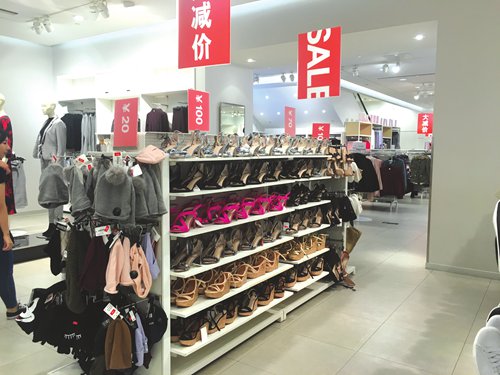
Shoes are arranged on shelves for sale at an H&M shop in the Joy City shopping mall in Beijing's Chaoyang district at Thursday noon. (Photo: Ma Jingjing/GT)
Local brands challenge the likes of H&M in China
Chinese consumers' enthusiasm for international fast-fashion retailers such as H&M has cooled, caused by both concerns over quality and the rise of domestic brands.
The three-floor H&M shop located in Xidan Joy City in central Beijing is closed, with a notice saying that it has temporarily suspended operation due to "internal decoration." But tech news website 36kr.com reported that the outlet will be vacated permanently. It cited sources close to the matter.
H&M didn't immediately comment when reached by the Global Times via e-mail on Thursday.
"As far as I know, the shop in Xidan Joy City is closed temporarily for decoration. All shop assistants have been reassigned to other branches," a shop assistant who declined to be identified at H&M in Chaoyang Joy City, also in Beijing, told the Global Times.
Whether the H&M store in question is closed for renovation or forever, it seems that H&M's products have lost their appeal for many Chinese consumers.
A woman surnamed Lin told the Global Times at the shop in Chaoyang Joy City that she often browses at H&M but rarely buys anything.
"The fabric and design of the clothes are not as good as before. If I do buy something, it's a basic item like a T-shirt," she said, noting that she felt fewer customers patronize the store now.
A shop assistant said that there are more customers during sales promotions, but fewer clients visit on regular days. "We have about 20 staff members at the shop, but only seven or eight work at a time," she said.
The company's sales growth rate has declined in the Chinese mainland market, with the figure at 4 percent in the second quarter of this year, compared with an average of more than 20 percent before 2015, 36kr.com noted Thursday.
Low quality is a big flaw for H&M, according to Zhang Qing, CEO of Beijing Key-Solution Sports Consulting Co.
Fast-fashion retailers chase the latest designs at the lowest cost, so their quality can't match that of items produced in a long manufacturing cycle, experts noted.
Substandard quality is a common problem among fast-fashion brands. Data from China's General Administration of Quality Supervision, Inspection and Quarantine showed on July 7 that 77 batches of fast-fashion clothes including some from H&M, Zara, GAP and GUESS were sent back or destroyed in May due to unqualified color fastness or pH or formaldehyde readings higher than the required limit.
Frequent exposure of quality issues has eroded consumers' opinion of these fast-fashion brands, turning many of them off almost permanently, Zhang said.
Competition in the fast-fashion segment has escalated in recent years, mainly due to the growth of local brands, said Wang Zhuo, a senior clothing industry expert.
"The fast rise of domestic brands including URBAN REVIVO (UR), Peace Bird and Heilan Home poses challenges and threats to their international counterparts," he told the Global Times on Thursday.
Between its establishment in 2006 and August this year, UR opened more than 160 stores in China and abroad, according to a report on industry website china-ef.com in August. In August alone, it opened four stores, compared with H&M's 21 in China in the first half, according to data from commercial real estate website winshang.com.
The rise of virtual shops on e-marketplaces like taobao.com of Alibaba Group Holding has also shaken the global growth of fast-fashion retailers, Zhang noted.
According to a report from New York retail research institution Fung Global Retail & Technology in May, a new set of younger online-only retailers - such as Boohoo.com, ASOS and Missguided - are competing head-to-head with traditional fast-fashion companies like Zara and H&M, with new players cutting the period from design to sale to as short as a week or two.
Thus, fast fashion is changing into ultra-fast fashion, it said, noting that shoppers increasingly "want it now" and production cycles are speeding up.


















































